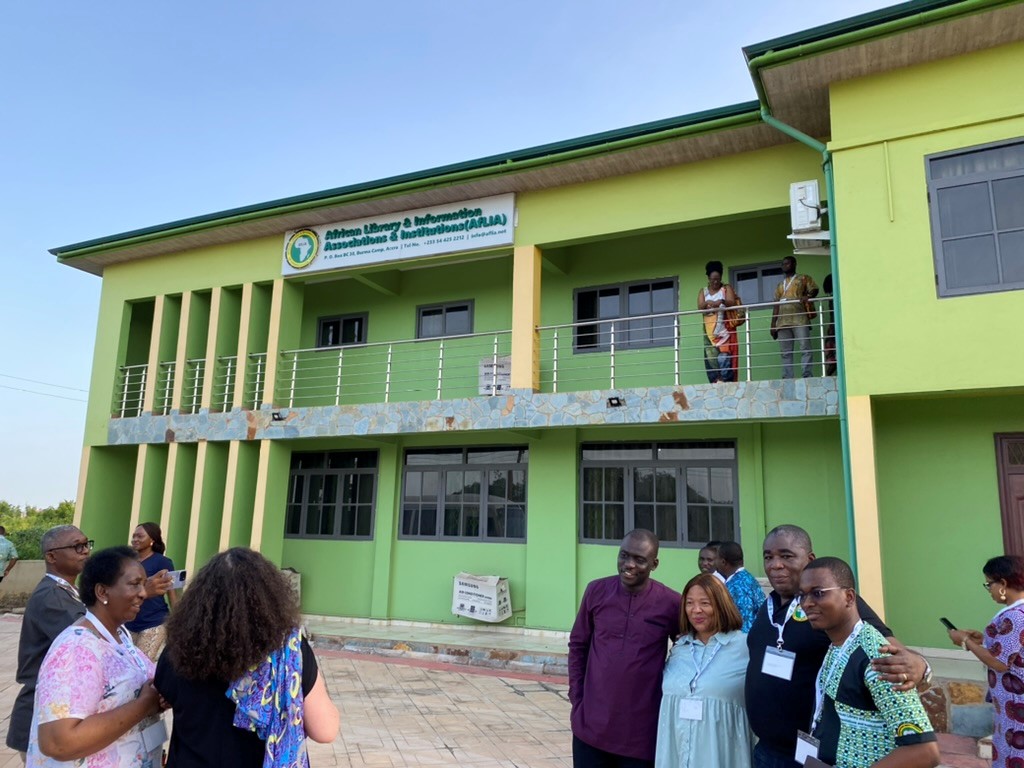

Tony Lelliott
Librarians and professionals from related fields across the continent (and beyond) came together in Accra, Ghana in late May 2023 to share experiences on technology, curricula, digitisation, decolonisation, sustainable development, indigenous knowledge and openness, as they relate to libraries. This year marks the 10th anniversary of the formation of African Library and Information Associations and Institutes (AfLIA), and the conference was a welcome return to face-to-face collaboration, although it included an online component too. I was attending the conference for the first time on behalf of Saide, as the OER Africa project is collaborating with AfLIA in order to support professional development, particularly in the areas of Open Educational Resources, Open Access publishing and other fields within the open ecosystem. In addition, Saide’s African Storybook was represented by the West African partner coordinator Mimi Werna (see separate newsletter article).
The conference was preceded by a workshop on Wikidata that showed participants how to use the Wikidata repository and create data for reuse. AfLIA has a collaboration with the Wikimedia Foundation and the workshop helped to capacitate librarians in the Wiki space to create structured data for use by others, including the Wikimedia wikis. Of course, all of the Wikimedia projects create products that are openly licensed, and although such products might not be academically reliable to cite directly, they are excellent places to search for primary and secondary sources.
The official opening of the conference by, among others, the CEO of the Ghana Library Authority was followed by presentations on the open ecosystem and the AfLIA 10th Anniversary Celebration and book launch. Highlights from the subsequent days included discussions around decolonising learning and children’s literature, the UNESCO OER recommendation, learning in libraries, Indigenous Knowledge Systems (IKS), and digital skills and competencies.
Several of the presentations integrated multiple topics; for example, decolonising research and learning suggests basing research in Africa-based repositories so that it is more accessible to African universities. Projects such as Figshare open access repository and the Training Centre in Communication (Kenya) advocate for open data, open science and scholarly communication. While there is some support for making indigenous knowledge a basis for sustainable development, researchers from Nigeria lamented a lack of capacity for indigenous management integration. An entire session was dedicated to discussing the 2019 UNESCO OER Recommendation, which builds on the Ljubljana OER Action Plan 2017 to mainstream OER to help all Member States to create inclusive knowledge societies and achieve the 2030 Agenda for Sustainable Development. The OER Recommendation addresses five objectives: (i) building capacity of stakeholders to create, access, re-use, adapt and redistribute OER; (ii) developing supportive policy; (iii) encouraging inclusive and equitable quality OER; (iv) nurturing the creation of sustainability models for OER, and (v) facilitating international cooperation. However, the complex and technical nature of the Recommendation, demonstrated the need for a document to be developed to explain the recommendation and its relevance to librarians. Aflia in association with NBA have committed to preparing an overview document for African librarians which will be disseminated across the continent. It is encouraging to observe that libraries are often centres of learning: from financial empowerment programmes for rural women in Nigeria, to STEM education in Ghana, to coding in Uganda, to peace and conflict resolution in Zimbabwe.
The sub-theme of openness helped to alert many library professionals to the concepts of OER, open science, open data and open access publishing. In informal conversations, I was struck how keen many of the participants were to embrace the ‘open’ world, and their realisation that libraries are key to providing access to open resources. Meeting librarians from countries across Africa, I was invited to present sensitisation sessions on openness that can help to spread the word even further. The lockdowns from 2020-2022 have shown that webinars can be used for such advocacy presentations on a cost-effective basis, and OER Africa plans to take the opportunity to engage with librarians in several countries.
The success of the AfLIA conference demonstrates the continuing need for face-to-face fora where professionals can interact and share research and ideas. OER Africa will be collaborating with AFLIA for at least the next two years, and we look forward to enabling and supporting library professionals to work with all aspects of openness, which is key to learning now and in the future. Our immediate plans involve further joint webinars, the development of a Moodle-based course on openness that AfLIA can run on a country-by-country basis and support for AfLIA’s long-term professional development strategy to support the work of its members.

Dr Tony Lelliott presenting at the AfLIA conference in Accra, Ghana

The new AfLIA headquarters on the outskirts of Accra